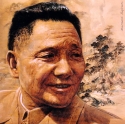|
I hereby introduce legislation known as bill 4-20.Bill 4-20 posted:The turn will be posted. https://www.youtube.com/watch?v=igmK7tJ2uyw
|
| # ? Mar 1, 2014 07:42 |
|
bump
|
| # ? Mar 1, 2014 19:35 |
|
Update 3: Quarter 2 (July - Sep) 1877: Domestic News Meet the Replacements We each have our place, and our duties. To fail to carry out those duties must have consequences, or the entire basis of our society would collapse into chaos. As soldiers it is your duty to uphold the Constitution of this Republic. As President it is my duty to see that your sacrifice and service are never wasted or used for personal gain - President Enomoto Takeaki, on why he chose to fire the Navy and Army magistrates. Early July was characterised not just by the death of Matsudaira Katamori, but by the announcement of the sacking of both the Army Magistrate and Navy Magistrate by President Enomoto Takeaki. Citing defiance of his orders by the Army Magistrate Otori Keisuke, in which the Army Magistrate openly defied his commander in chief’s command to deploy 5,000 forces to Satsuma rather than 1,000, Otori Keisuke was formally removed from his position by the President. Arai Ikunosuke, Navy Magistrate, was removed for less directly confrontational reasons, with the President arguing that his lies and support of Otori Keisuke served as grounds for his removal. Otori Keisuke immediately protested, and many within the army and navy sided with their magistrates in opposing the sacking. While most did not openly wish to defy their President, both Otori and Arai had served in their positions since the Republic’s inception, and personal loyalties to their commanders ran deep. Otori Kesiuke argued that his removal was not constitutional, instead arguing that a replacement needed to be confirmed before his removal became official. An emergency meeting of the High Court ruled in favor of Enomoto on July 5th, and Otori was officially removed from his position as Army Magistrate, as was Arai Ikunosuke. A following emergency meeting of congress confirmed their replacements, with Matsudaira Sadaaki replacing Otori Keisuke as Army Magistrate, and Katsu Kaishu replacing Arai Ikunosuke as Navy Magistrate. As foreshadowing for future troubles, the votes proved quite contentious, with both nominations facing considerable opposition from Enomoto’s Republican faction, as well as the Christian faction. Their concerns were overcome by the voting power of Homeland and Sakoku (ardent supporters of Sadaaki), as well as loyalist members of the Republican faction, with many Congressmen walking out in disgust. The first actions of the new cabinet sought to prevent any actions of the former cabinet members, which later events would show were soon to be forthcoming. NINJA, a recent creation of Arai Ikunosuke, was officially disbanded, though its members did not immediately react to his decree from above.  Most dramatically, President Enomoto officially challenged Otori Keisuke to a duel in Congress, declaring his intention to duel to the death for the dishonorable actions of his subordinate. Performing the traditional rituals daily, from July 3rd and on, President Enomoto called upon Keisuke to duel him, with Keisuke initially accepting the offer of the duel but failing to act upon his acceptance. This inaction significantly harmed his honor, but later events would eclipse any of these happenings… (+Removed Cabinet members, +New Magistrates, +Very angry former Magistrates) The Best Laid Plans... There are three ways in which a ruler can bring misfortune upon his army: [...] By attempting to govern an army in the same way as he administers a kingdom, being ignorant of the conditions which obtain in an army; This causes restlessness in the soldier's minds. By employing the officers of his army without discrimination, through ignorance of the military principle of adaptation to circumstances. This shakes the confidence of the soldiers - Sun Tzu The removal of the Army Magistrate by the President quickly set into action a series of events which demonstrated the true intentions of the Army Magistrate and his allies. During the process of his removal, with his replacement unclear and the constitutionality of his removal uncertain, Otori Keisuke set about preparations for an impending invasion by Meiji Japan of Ezo. Few questioned these actions, especially given the raid on Ezo’s coasts by Meiji the previous April, but this left the military’s position in a rather confusing mess by the time of Matsudaira Sadaaki’s official instatement on July 10th. Much of the army, by this time, was dispersed to very remote parts of the Republic, with those closest to Otori Keisuke closest to the capital, and those under the command of potentially dissident or loyal generals in the worst position to react to coming events (with Sadaaki’s forces in Sado at the time of his instatement). As Keisuke left office, a flurry of memos began appearing in the hands of army officials and civilians alike. These memos first implicated President Enomoto for the attempted assassination of Saigo Takamori, angering many due to its somewhat dishonorable nature, as well as angering many of the Matsumae, who blamed the President for the capture of their clan leader. Others within the army questioned the President’s judgement given the eventual disaster that would be the Satsuma operation, though this also served to raise the question of Keisuke’s own involvement in limiting the size of the forces there, with many feeling that greater numbers would have averted such a disaster. More damaging for the President, however, was the release on July 12th of a series of memos outlining a planned purge of the army by the new Magistrate Matsudaira Sadaaki. This seemed particularly believable in light of the anti-Christian sentiments of the Army Magistrate, his own actions at the Blakiston wedding, as well as the recent dismissal of the NINJA organization under Arai Ikunosuke. An “official list” was published, and denied by the Enomoto administration, naming many officers and soldiers as potential enemies of the state and recommending their removal from their positions. This raised considerable alarm in the army, many of whom hoped to avoid the same fate as their former Army Magistrate. With dissent in the army at a peak, and with the Navy Magistrate also acting unilaterally (see below), Otori Keisuke made his move. His forces stormed Congress on July 14th, and barricaded the door, trapping the assembled Congressmen. By this time, President Enomoto had begun to anticipate that the Army Minister was going to take some action against the government, but his administration had focused more on the instatement of the new magistrates, and did not anticipate a legal coup on top of a military coup. Those within the assembled Congress who disagreed with Keisuke’s actions were allowed to leave (or forcibly removed), until only 25 remained, preserving quorum, and no more were allowed to leave. Of these 25, many supported Otori Keisuke’s desire to resist the President’s dismissal (many supporting Keisuke due to his assistance in the previous election, owing him their job). A combined 10 Republican and 3 Christian party representatives voted, by a majority of the 25 assembled, to alter the rules of Congress so as to reduce the quorum from 25 to 20, and 5 of the remaining members were then removed, lowering the number of Congressmen present to 20. This allowed Keisuke’s loyal Congressmen, 13 in total, to vote for the expulsion of all 30 non-present Congressmen, granting Keisuke a supermajority in Congress. The former Army Minister then voted to reverse the removal of himself and Arai Ikunosuke and reinstated them to their positions. The rump-Congress then voted for the impeachment of President Enomoto for the attempted murder of Saigo Takamori (among other charges), and of Vice President Matsudaira Tarou for the murder of Matsudaira Katamori. Pre-empting conviction, Keisuke produced documents proclaiming the President and Vice President’s resignation. According to the order of succession, this made, in the mind of Keisuke, Arai Ikunosuke the President of the Republic, and he called on Ikunosuke to support his actions. As this rather complex legal justification what amounted to a coup began to spread across the capital, the now expelled Congressmen outside began to rally supporters and inform nearby military units of the actions of Keisuke and his supporters. The military (those loyal to Keisuke) refused to listen to their pleas to restore order, and instead ordered the men home, condemning their behavior as threatening to the stability of the Republic. The Congressmen grew restless, and as supporters of President Enomoto began to assemble around Goryokaku (the fort and center of government), the military became increasingly uneasy. The forced removal of Congressmen turned violent, and a large melee broke out as Congressmen resisted their forced removal. As samurai, Congressmen began drawing their swords to resist removal, and the military responded in kind. After a small battle within the fortress, 4 Congressmen lay dead (3 homeland and 1 loyalist Republican) and 6 more injured, as Keisuke officially gained control of the fortress. Rather than rallying support around Otori Keisuke, those outside of his circle of supporters began to react to the unfolding coup. President Enomoto, who was removed by gunpoint from within the fortress despite his calls for Keisuke to “face him with honor”, immediately set about mobilizing the armed forces now dispersed far and wide to respond to the coup. While Otori Keisuke had ensured that those most loyal to him were in the capital at the time of the coup, not all the military rose up in his defense as he had hoped, and a small contingent of loyal military forces, retinues, and angry samurai began to assemble under Enomoto and Sadaaki’s command. While lacking the necessary forces to overcome the very defensible fortress, Sadaaki’s forces, as well as those loyal to the President and others within government began marching at full speed back to the capital at the President’s behest. Some military officials, citing confusion (and many speculate, some sympathy with Keisuke’s actions) simply refused to budge from their positions. Furious at their actions and angry at Otori Keisuke’s actions, Enomoto ordered the immediate bombardment of Goryokaku, and his actions were met with returning fire from within the fortress. 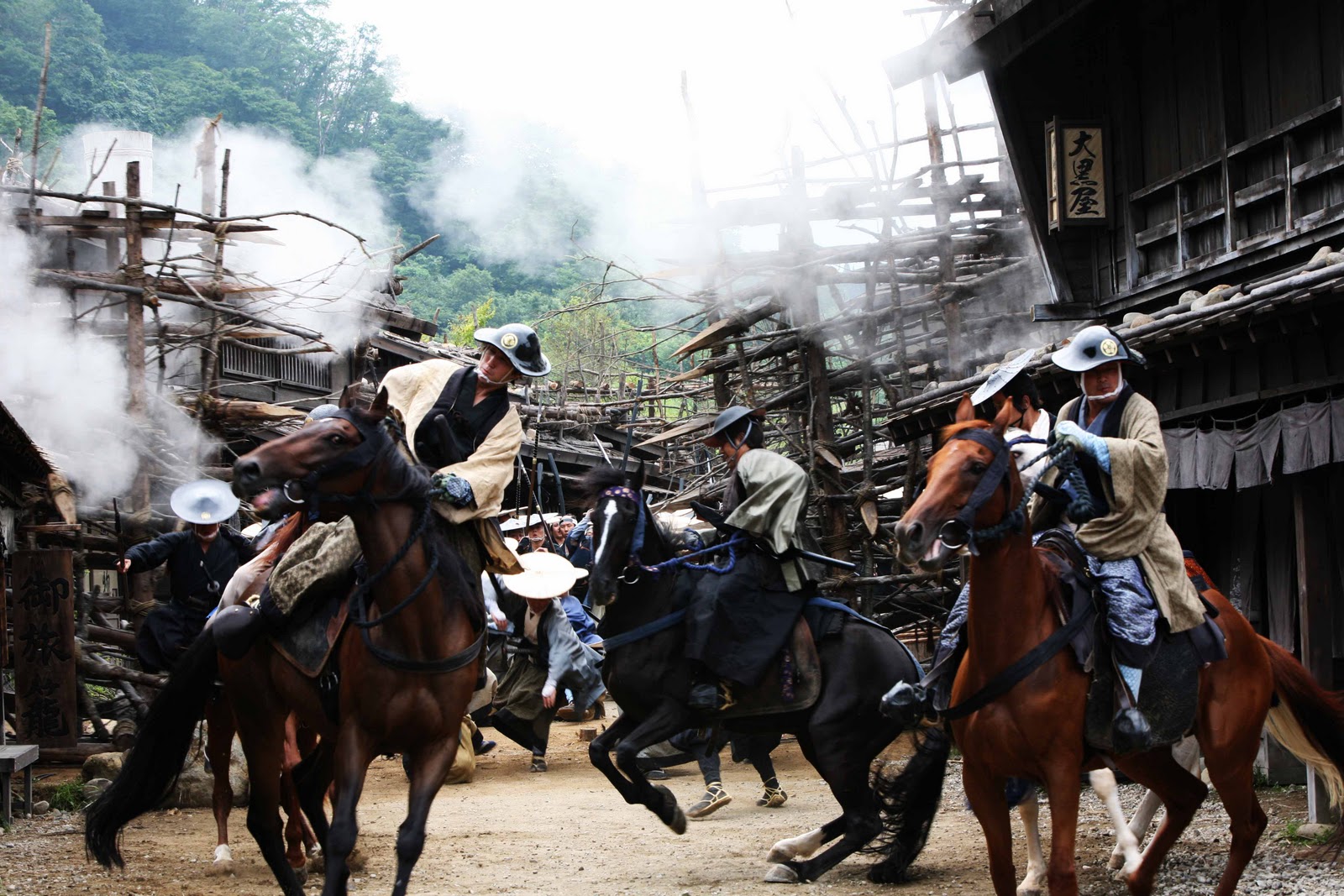 1600x1067 Within the fortress, one neutral actor had not been removed by Keisuke’s army units. Emperor Enjuu, who also has a residence within the fortress, was approached by Keisuke seeking legitimacy for his cause. Reportedly offering the Emperor considerable official power in any new government led by him, and declaring his intention to commit seppuku should his offer not be accepted, the Emperor was left in an awkward position. Seeking to maintain his neutrality, but also not eager to see a man kill himself in front of him, Enjuu did his best to offer tacit but conditional support to diffuse the situation. While Keisuke interpreted this as an endorsement of his coup, Enjuu would later deny this assertion, and his lack of any meaningful moves to support the coup or take any action to legitimize Keisuke’s government seem to support this. The Emperor remained a hostage throughout the ordeal, and was confined to the most fortified areas of the fortress, largely powerless to intervene in the proceeding events. This is the End Meiji has not invaded, and do you know why? They fear us, they fear me - Enomoto is weak, but I, and President Ikunosuke, serve as a strong deterrent to the Imperial usurpers -Otori Keisuke, to his soldiers within Goryokaku With the Emperor’s support (at least in his mind), Keisuke set about legitimizing his new regime, even as its control extended little further than the points on Goryokaku’s star. Citing his coup as the “deterrent which ensured our protection against Meiji,” Keisuke used agents to sneak outside Goryokaku to spread propaganda in his favor. His agents reported disappointment, and increasing difficulty in leaving the fortress. By August 2nd, reinforcements had arrived from some of the surrounding regions for Enomoto’s counter-coup, and Sadaaki’s forces in Sado were set to arrive by August 20th. It became readily apparent that the army was not inclined to join the coup against Enomoto, and the non-military components of society were hardly eager to rise up against Enomoto either. While many criticisms of Enomoto appealed to military and non-military alike, the somewhat transparent actions of Otori Keisuke, and the vaguely legal actions of his rump-Congress, hardly inspired those to rise up against a President who was a decorated war hero and who had run the Republic since its inception. It should be noted that a great number of military units did profess neutrality in the coup, enraging Enomoto but not exactly assisting the coup plotters. The majority of these units were Christian or run by Christian commanders refusing to accept the legitimacy of Sadaaki’s appointment, though most would fall in line with the eventual outcome of the coup. 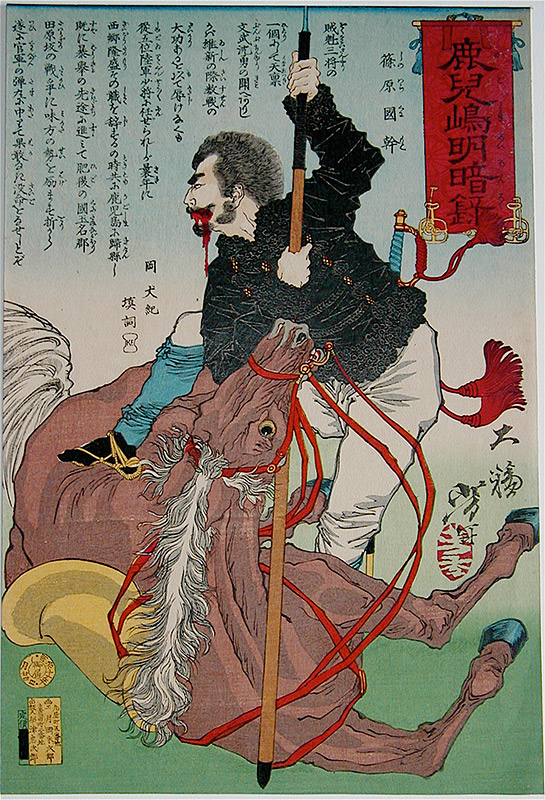 Bombardment of Goryokaku only increased as the more guns and forces were assembled to oppose the coup, with President Enomoto personally commanding the units rapidly assembling in the capital. Jules Brunet, in an offer of loyalty to his former comrade, lent French artillery and gatling guns recently imported from France, wreaking havoc on the fortress. Confined to his fortress and desperate for assistance, Otori Keisuke and his loyalist forces and Congress quickly realized that their coup was likely doomed to fail. With no long-term game plan, and no clear exit strategy, Keisuke’s forces began to waver, and talk spread among the men to throw Keisuke under the horse in exchange for the cessation of the bombardment of the fortress. On August 15th, as Otori Keisuke awoke to prepare to oversee his forces, he noticed a white flag flying over the fortress walls. He was further interrupted by the arrival of men loyal to President Enomoto, who, with Keisuke at gunpoint, announced his arrest. Keisuke initially reached for his sword to resist, but later thought better of his actions, and allowed himself to be arrested, along with 13 members of Congress. Keisuke’s coup had come to a rather anti-climactic end, with his forces having surrendered the fort. It would later be revealed that the white flag was a ploy by only one portion of his men (mostly Christians who were dismayed by Arai Ikunosuke’s lack of active support of the coup, as well as Kasuga Saemon’s neutrality), and a battle had ensued, but ended quickly as Enomoto’s forces stormed the fortress amid the chaos. In any case, Keisuke’s coup was ended, with the former Army Magistrate now facing very serious charges of treason. The Fallout Revolutions, whether successful or failed, are certain to build nothing but ashes. - Education Magistrate Itakura Katsukiyo These series of events crippled the government for almost 2 months, and left many confused about the political and military situation in the Republic. The first act of the President in the post-coup environment was to issue an “executive decree” invalidating all actions taken by the rump-Congress, and reaffirming the positions of Matsudaira Sadaaki as Army Magistrate and Katsu Kaishu as Navy Magistrate. Congress also passed a law invalidating the actions of the previous rump parliament, and officially expelling the 13 “rebellious” lawmakers. 4 Congressmen lay dead, 6 more recovering from their wounds, and 13 arrested for their actions during the coup. This left only 27 Congressmen in condition to act (though 33 still served) on issues of importance, and as a result, bills proposed the previous quarter were tabled for the time being. The Finance Minister’s budget was passed by the now considerably smaller parliament, and many are calling for new elections to rectify the many absences within Congress. The Christian party members have since disavowed their support of the coup and sought to have their positions reinstated, with their actions in ending the coup serving as their “means of penance.” Otori Keisuke remains in the hands of the government, and his fate will be determined by their will.  The composition of the Congress (before any elections or replacements) is as follows: Congress posted:House of Representatives (total 33): Speaker Enomoto Michiakira (Republican-faction) Within the country, many in the military lie dead or under arrest, as Keisuke’s forces did not surrender en masse. Some 400 samurai within the army are dead having fought on Keisuke’s side, and another 500 surrendered after the events of the coup, and remain under guard within the ruins of Goryokaku. Another 200 men who remained loyal to President Enomoto also died in the fighting. The Emperor emerged safely from the inner reaches of Goryokaku, and has disavowed the coup, and called for unity. The fallout of the coup has not been entirely military - many within the country have begun to doubt the leadership ability of President Enomoto, even as they rallied behind him against Keisuke’s coup. Coinciding with rallies opposing the government by Katsu Kaishu, and letters by Yarumaro (see below), many within the Republic are beginning to question the rule of the samurai. Samurai are to be noble and loyal, and actions within the samurai elite against one another have cultivated an image of dissent and bickering among a corrupt and self-interested elite, not boding well for the Republic, especially as Meiji looms on the horizon. (-600 dead samurai, -500 captured samurai, +captured Otori Keisuke, +13 captured congressmen, -4 dead congressmen, +ruined Goryokaku fortress, -Respect for samurai in the Republic) A Bad Enough Dude to Attack the President ”Fact: Samurai betray ALL the time.” - The Sosai, W.S. Gilbert and A. Sullivan, 1885 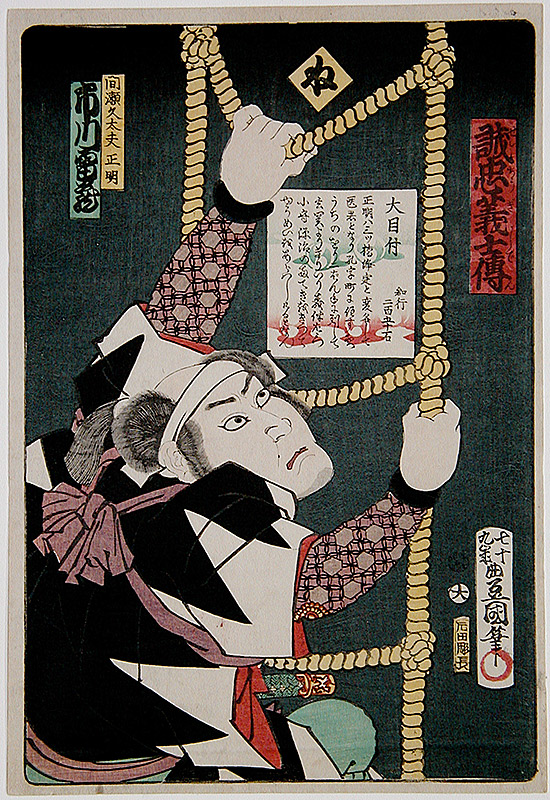 Even as the ashes cooled from the devastated Goryōkaku, another mutiny was underway. Not content to be outdone by the Army boys, the Naval command similarly embarked on actions against the Commander-in-Chief. Within days after the fall of Otori, NINJA, the brainchild of disgraced former Navy Magistrate Arai Ikunosuke, published the so-called “Pentacle Papers”, documents asserting that the president himself had a hand in the assassination of Saigo Takamori, leader of the Satsuma Rebellion and presumable friend to the Republic (in an enemy-of the-hated Meiji enemy sort of way). Even more devastating was the revelation that both the President and new Army Magistrate Matsudaira Sadaaki were responsible for the infamous Gaijin Wedding Massacre of the previous months. These papers rocked the country. Such allegations shocked many samurai as well as the occasional literate lower classes. All Englishmen in the country demanded a response to them. However, just as quickly as they arose, they were immediately knocked back- in the wake of the horrific coup that had just happened, support for the beleaguered President was reflexive from some quarters. Even as the official investigatory committee promised to look into the accusations, the Shinsengumi, Justice Department, and smaller law enforcement agencies also looked into the report. The nascent press of Ezo swarmed around the revelations, claiming to have received further documents confirming the stories from other gov’t sources. Soon after, NINJA agents were on the run, ostensibly from government forces intent on keeping the watchmen from being watched. Within days, most of Magistrate Ikunosuke’s staff had seemingly disappeared, and so had most of his ships. On the docks of Hakodate, rumors say that the fleet had been destroyed, and Ikunosuke himself had been executed by the admiralty as well. This confused mess of exposition was further complicated by rumors that this treachery on the high seas was the work of a cadre of admirals seeking to defect to Meiji by shattering the Navy, the Republic’s greatest katana. This was further complicated by the sudden reappearance of many of the naval ships, returned from seemingly nothing more than common patrols or routine operations. However, the former Naval Magistrate himself, as well as several important vessels, have seemingly vanished. Several of the returning sailors report irregular movements on the part of the missing ships before they disappeared, even cannon fire breaking out between them. And still others say they spotted Meiji ships in the distance... (?NINJA disappear?, -2 steam powered frigates, -former Secretary of the Navy, +rumors and discord, +noone has any idea wtf just happened) A Few Good Men “Do you think your ninjitsu sword will defeat me?” - Saitō Hajime, captain of the 4th unit  Amidst all of the chaos of this period, the Shinsengumi were growing steadily. The Demon Commander’s new police academy was bustling with activity, even as a monument was erected for those who died in the line of service during the Independence War and in recent events. Soon afterwards, it would appear that not all of the recruits were merely interested in the game of “footy-ball” at the academy. A few of the new recruits are found to be louts paid to join the august police force for the sake of disruption and surveillance by none other than former intelligence agency NINJA! Though their presence is unexplained, the police immediately begin internal investigations into the possibility of further moles, both in the Shinsengumi and in other government agencies. (+recruits for the Shinsegumi, -NINJA spies)
|
| # ? Mar 1, 2014 22:48 |
|
A Mystery Incorporated Woh man, I’m like, totally hungry. Got some food? - Mukuge-kun, one of the young sleuths investigating the wedding bombing With the Meiji army looming on the horizon, coups nearly toppling the government, and murderer fugitives running amok in the countryside, more energy was devoted to the most vital issue in Ezo: finding the culprit behind the murder of Masako Blakiston. While most Ezo residents would simply respond “Matsudaira Sadaaki” if you asked who they felt was responsible for the Blakiston wedding debacle, many an intrepid detective in Ezo was not satisfied with this explanation, and at least half a dozen investigations were launched. The most important, and well funded, investigation came from the British government, working in concert with Thomas Blakiston. Blakiston’s great economic clout and many local contacts, as well as sympathetic Japanese, significantly assisted his and Britain’s investigation, and Blakiston had more or less full reign of Ezo and the crime scene in order to conduct his investigation. Blakiston was not alone however - the government of Ezo authorized its own investigation, and while Congress’ troubles prevented the official endorsement of an investigation, Kasuga Saemon set out to determine the culprit in the Blakiston wedding. Along with Saemon, rumors also swirled of a group of young teens investigating the scene, accompanied by a large hokkaido-inu named Buriburi-kun. The investigation began first with a thorough examination of the wedding scene itself, but unfortunately, the ensuing ruckus ensured that disentangling the bombing from the post-bombing mob would be rather difficult. What became very apparent very quickly, however, was that someone was intent on ensuring the culprit of the bombing was not found - and given that Sadaaki was thoroughly distracted with his duties as new Army Magistrate (and the resultant coup) the British-Blakiston investigation concluded that someone other than Sadaaki was involved in the wedding massacre. Saemon’s investigation concluded the same thing, and added to the findings of the Blakiston investigation with an additional insight. Those at the wedding claim that the culprit rose from the groom’s side of the wedding, and Saemon’s investigation concluded that Blakiston’s security was so distracted by the mob that it failed to adequately screen the guests, but the perimeter itself was largely impermeable. With this in mind, the Blakiston and Saemon investigations came to the same conclusion: someone with access to the wedding was likely responsible for the bombing, and it wasn’t Matsudaira Sadaaki.  2700x2025 The biggest breakthrough, however, came at the hands of Buriburi-kun, the Hokkaido breed of dog owned by a group of amateur sleuths who independently chose to investigate the wedding scene. Buriburi-kun, mistaking a pile of dirt for a stash of buried Ainu donuts, dug up the remnants of where something large was buried. What Buriburi-kun found was a large empty hole on the outskirts of the former security perimeter, implying that someone with access to wedding was able to bypass security with a large explosive device, and utilize this security clearance to bury it ahead of time and later move it under the main wedding tent. What this means is that the culprit is likely someone close to or in either the Blakiston or Tokugawa families, as those are the only groups capable of the kind of privilege that would have allowed the smuggling of such a large and otherwise conspicuous device. Sadaaki’s mob was found to be responsible for much of the damage to the British guests (angering the British, of course, in light of his army magistrate appointment), but further investigation of Masako Blakiston’s body revealed severe burn wounds and wooden shrapnel in her head and spine - implying that it was the bomb impact, not the mob, that resulted in her death. None of the investigations was able to conclude who in particular was responsible for the bombing of the wedding, but the following is clear: someone other than Sadaaki was involved in the bombing, they’ve attempted to cover it up, and they’re very, very close to the Tokugawa or Blakiston families. This implies something of a scandal, for either Blakiston or someone close to him tried to kill his wife, or the shogun’s family or close advisors were determined to sabotage the wedding of one of their own, and resulted in her death. (+Clues for wedding culprit, -Some distaste for Sadaaki, +British outrage) Run For the Hills John Wilkes Booth… he told me to do it… give it all to Brunet… Booth says I’ll be safe… Run, run, run… its hurts... -Thomas Crusoe’s mumblings and screams as he fled Hakodate A duel took place on July 4th, in which Matsudaira Katamori was struck down by Matsudaira Tarou after an altercation of honor. Katamori, however, was only crucially wounded by the Vice President, when Thomas Crusoe, a spectator to the duel, rushed forward and repeatedly bashed Katamori’s head. Already weak from the duel and rapidly losing blood, Katamori perished, and Crusoe quickly became responsible for the death of a high ranking samurai within the Republic. Immediately, Crusoe began to wail, claiming the ghost of John Wilkes Booth possessed his body, and decrying enemies all around him, as he held his head and began to flee the scene. The young shogun Tokugawa reacted quickly, and pierced his leg, only reinforcing the comparison between Crusoe and the ill-fated Booth. Crusoe rapidly fled as chaos ensued, and before the dust settled on the scene, Katamori was dead, and Crusoe had disappeared. Though he was bleeding, he scrambled through the streets of the capital as far as he could, darting through the alleys he knew so well. Scrambling to contain the blood loss and to keep from leaving a trail of plasma, he came across a deserted cart of pots and pans. His memory flashed to that of a tale he had heard in the British Pacific colonies about an outlaw who wore armor, he quickly constructed a makeshift metallic body harness to stem the flow. Suddenly, the merchant who owned the cart appeared.  327x450 “Thief, Thief!” accosted by several Tokugawa men, Crusoe saw no choice. Taking out a match, he soaked a bloodied bandage into his lunch flask and lit the rag aflame. Tossing his cocktail into a sake street booth, Thomas Crusoe ran away from the ensuing fireball in his sharecropper armor, his would-be captors engulfed by the inferno. The young Tokugawa, along with the Finance Magistrate Nagai Naoyuki, immediately called for Crusoe’s arrest, and a warrant was issued calling for his capture for the murder of Matsudaira Katamori. Crusoe however had cultivated many contacts among the Hakodate underground, and quickly disappeared from the capital. He could not entirely cover his tracks, and it quickly became apparent that he had fled to the hills of Ezo, hoping to conceal himself in the forests and mountains that characterise Ezo’s hinterland. As Crusoe fled, a free for all erupted for his properties and criminal enterprises. Intending to leave his fortune and properties to Jules Brunet, Crusoe had little time to ensure a steady transition, and likely had to flee Hakodate before establishing Brunet as his heir. Brunet’s involvement could not remain secret for long due to his celebrity, and it rapidly became apparent that he was largely responsible for Crusoe’s successful flight. Despite Crusoe’s desires, and Brunet’s role in smuggling him from the city, Crusoe’s former enterprises began squabbling over succession, with many of his former underlings seeking to replace him. There are rumors that other rival merchants, such as Katsu Kaishu and Hayashi Tadasu, have begun buying up some of his former properties, and many fear that the fractionalization of the criminal enterprises in Hakodate’s underground scene could spill over into violence in the streets. Thus far any violent conflict has been restricted to the seedier parts of Hakodate, but as the new players emerge, and as Crusoe’s departure appears to be more than temporary, this peace may not last. As for Crusoe himself, his whereabouts remain unknown, despite considerable efforts to find and capture him. It is apparent that he has some powerful friends ensuring he remains hidden, as offers of rewards or compensation for his capture have fallen on deaf ears. Whether he can stay hidden indefinitely remains to be seen. (+Chaos in the criminal scene, +Scandal for Brunet, -Known whereabouts of Crusoe, +properties for Kaishu and Tadasu) The Sum of its Parts Religion? No. Politics? Hardly. Imperial lines and Bafukus? Of course not. There is only one thing everyone in Ezo, be they foreigner or Japanese, can agree upon - the noble and honorable pursuit of wealth. -Katsu Kaishu While politics in Ezo remain a chaotic source of discord and intrigue, the economy of Ezo has, for the most part, performed miraculously. The personalities driving Ezo’s economic boom have largely carved for themselves specific sectors and roles that, while not mutually exclusive, have ensured cooperation on a grand scale with one common goal - to make themselves rich. Chief among the merchants within Ezo is Katsu Kaishu, one of the most influential and powerful Japanese in the Republic. Increasingly inclined to intervene in the political scene, Kaishu enjoys the tremendous boon of being an official samurai, granting him the privileges of power denied to non-samurai Japanese and foreigners alike. While not particularly popular on any personal level, his willingness to advocate for reform, and throw money at problems and potential enemies, has made him one of the power brokers within Ezo. He has begun the construction of a railroad from Hakodate to Sapporo, with a grand “Tokugawa Station” in Hakodate set to define its rapid modernization. With all of his power, however, come enemies and friends alike. Investigations have begun into his internal dealings, with some in Ezo suspicious of his intentions and wary of his political aspirations. These investigations, however, have not come from the government, but largely his competitors in the international scene, many of whom are jealous of his success and position as a samurai-merchant, a seeming conflict of interest. Thus far, the investigations have yielded nothing of note nor any illegal practices, but there can be no doubt that the wealth and power Kaishu has concentrated around himself has often come from bribery and economic power. Kaishu has largely focused in recent years on expanding his enterprises both internal and domestic, including expansion into areas abandoned by the flight of Crusoe, but has otherwise avoided any particularly nasty or conspiratorial actions. While bribery is certainly rampant within his consortium’s areas of influence, utilizing wealth to achieve your goals is by no means illegal in the Republic, and Kaishu will likely remain a power broker for some time. While Kaishu focuses primarily on internal commerce and as a middleman between foreigners, within Ezo Horace Capron rivals Kaishu and surpasses him in innovation. Capron has become a significant player in arranging for immigrants to arrive to Ezo through American middlemen, and already merchants and agricultural enterprises alike, as well as refugees themselves, are praising Capron for his work in silently driving the Ezo economy. His investments in agriculture, and the modernization thereof, have won him considerable praise from those who have profitted from the increase in productivity, as well as ensuring the viability (and self-sustainability) of Ezo. A quiet and otherwise unassuming man with few political aspirations, there are few merchants in Ezo with fewer enemies, and more friends, than Horace Capron. Internationally, Thomas Blakiston, still hurting from his tragic injury and dead wife, is the foremost bringer of international trade and commerce. Utilizing his contacts in the British navy and merchant fleet, Blakiston controls to a great degree the trade that flows to Ezo not just from Europe and the United States, but also from the rest of Asia and Britain’s colonies in India. Aside from Katsu Kaishu’s unique Russian contacts, not much enters or leaves Ezo without Blakiston’s knowledge. All of these men have thus carved for themselves a niche within Ezo’s booming economy, and it remains to be seen whether their ambitions will come to a head, or whether they will be content to cooperate to ensure continued profits. The increasing political instability, and the spectre of Meiji invasion, has raised some concern among the non-merchant segments of the population, who increasingly look to these outsiders as a source of protection, stability, and most importantly - wealth. (+Growing Ezo economy, +popularity of the non-politically involved merchants, +suspicions of their intentions) A Fair Tax ”9-9-9-9! That is my proposal for our tax rate, fair tax treatment among all four castes! Remove the discriminatory tax practices, and may we all prosper as equals! -Katsu Kaishu Katsu Kaishu was busy amid the chaos facing the Republic of Ezo, taking advantage of the widespread anger at the government for its perceived inability to both handle internal dissent and also provide a unified front against Meiji Japan, a series of rallies were held across the Republic. Holding meetings with locals to hear their problems (and periodically solve them with small infusions of cash), Katsu Kaishu attempted to both raise his profile and demonstrate the inadequacy of the samurai-exclusive government in dealing with the problems of the common folk. To coincide with his town hall blitz across the island, Katsu Kaishu also organized a number of tax protests by merchants and laborers angry about the caste-based tax rate. Conveniently ignoring his own beneficial tax status, Katsu Kaishu advocated for a dramatic lowering of the tax rate for all in Ezo, and for the tax rate to be equalized across castes. For now this has simply amounted to periodic protests by merchants and their allies, much of which was muted by the more serious coup attempt by Otori Keisuke, but there are rumors that the tax protests may increase in strength and severity should their demands be ignored. Amid this activity and protest, a series of letters have been published under the name “Yasumaro” in the newspapers of Ezo. Brilliantly written and demonstrating considerable understanding of the government and culture of Ezo, Yasumaro has written a series of treatises criticizing the government of Ezo, and calling for the gradual establishment of a unique national local culture. The Shogun in particular attracted the ire of Yasumaro, who criticized the Shogun as a figure doomed to divide the Republic. Instead, Yasumaro has advocated a unifying national figure not currently found in government, one above politics who can serve as a motivating figure for the defense of the nation. While most interpreted this as an endorsement of Emperor Enjuu, no such explicit endorsement was offered in the papers. Among intellectuals in Ezo, as well as those critical of government and seeking to enhance the position of the Emperor or institute radical reforms, Yasumaro has become an influential voice. (+popularity of Katsu Kaishu, +unhappiness at caste based taxes, +Criticism of government among intellectuals and reformers) Law and Order Our military duty lies with our state, not with our feudal lord or foul personal temptations. Look to our country to provide you honor, and in your service, make your country and your family proud! -Kasuga Saemon, an excerpt of his lecture at the military school As the Tokugawa Ieyasu University continues construction, classes have already begun on a smaller scale in some of the smaller and more hastily constructed buildings. While the grand European-style tower remains unbuilt, some of the simpler classroom structures have already seen some informal lectures, as the school seeks to lay the groundwork for its eventual expansion as the highest institution of learning in the Republic. In an attempt to raise its prestige and assist with its early development, Horace Capron increased his philanthropic standing by inviting American lawyers to lecture and teach at the to be constructed law school annex of TIU. The law annex is to be called the Tokugawa Masako School of Law (angering the Blakiston family who complained that it should be Blakiston Masako), and its first lectures saw a significant importation of American scholars and knowledge to train its prospective lawyers and professors. This has greatly increased the eventual effectiveness of the School of Law, as well as respect for the law within the Republic. The High Judge of the Supreme Court Takenaka Shigetaka has also continued the construction of the Supreme Court facility, which looks to be completed by the end of the year. Across campus, the military side of the school has already begun to resemble a European-style barracks replete with Japanese aesthetics and unique samurai training equipment. Surprising the aspiring officers of the Republic, Kasuga Saemon, a celebrity especially among Christians, made an appearance, and engaged in a series of lectures about military service, strategy, and its associated philosophy. Chief among his points was service to the Republic, as this is their ultimate duty, and the personal honor of their service stems from their devotion to their country. Though based on many lectures and writings originally of a religious bent, his speech to the military was largely devoid of religious rhetoric, though some hints of his philosophy’s origins were apparent to more astute observers. This has helped heal some of the temptations of fractionalization, and reinforced the sense of nationalistic duty among the future leaders of the Republican military. Saemon’s profile also rose as recognition of his intellectual and military assets became apparent to those within the Republic. (+Law expertise and respect in Ezo, +Sense of duty among officers, +Army training and morale, +Construction of SC building) A Bromance Too Brief My brother died… and what for? He died for you, he died for Ezo, but most importantly, he died defending the Republic against the very foreign snakes which would undermine our legitimacy and our purpose. He died in an honorable duel at the hands of a dishonorable fool! We will have vengeance, we will prevail! Joi! Expel the foreigners! - Matsudaira Sadaaki’s eulogy to his fallen brother Grieving after the unlawful death of his brother, Matsudaira Sadaaki held a great and elaborate funeral for Matsudaira Katamori. A veteran of the Sado operations, having given his leg in service of the Republic, many came to the Shinto-Buddhist ceremony to pay their respects. Sadaaki made great his role not just as a warrior but as a political and religious model to all samurai, and established for Katamori a legacy as a brave warrior and martyr to the traditional values that make Ezo great. Katamori’s body was laid to rest at the Matsudaira ancestral shrine and estate. This legacy has borne great fruit for Sadaaki, who has gathered many of Katamori’s former supporters around himself, and appears to have avoided significant blowback for his actions at the Blakiston wedding. Instead, Sadaaki has mobilized some of the more radical anti-foreign, anti-Christian elements within Ezo, and he and his militia have branded themselves defenders of the old order. As part of their operations to enforce traditional values, Sadaaki’s militia have branded themselves the “neighborhood watch,” and taken it upon themselves to police the streets of Hakodate, on the lookout for foreigners and christians performing illegal acts. This has already begun to spill over into the Crusoe-collapse debacle, with Sadaaki supporters busting gambling rings and whorehouses now operating without the organization and charisma of their former leader Thomas Crusoe. Foreigners have complained that they do not feel safe with the Nieghborhood Watch breathing down their necks, and the official authorities have been called upon to remove the militia and ensure fair treatment of foreigners and non-foreigners alike. Further complaints have arisen over the lack of prosecution of Sadaaki for his role in organizing the mob that ultimately disrupted, and ransacked, the Blakiston wedding. While the mob’s role in harming Masako Blakiston is yet unclear, the mob certainly can be blamed for escalating the violence and ensuring more died in the incident than otherwise might have. Sadaaki remains the prime suspect in the bombing itself, and the lack of accountability by the government of Ezo has greatly angered many, including the British. Yet, he is free, and faces no charges. All of this has made Sadaaki a rather polarizing figure - while most in Ezo condemn him for his role in the loss of life at the Blakiston wedding, and some still angry over the death of the Shogun’s sister, the radical xenophobic elements in Ezo have rallied around the man as one of the few willing to champion traditional values. His appointment to Army Magistrate may have contributed to the severity of the coup (as well as the neutrality of many Christians in the military during the brief conflict), and some Christians within the military are still uneasy with his appointment. (+Neighborhood watch in the streets, -Criminal and foreign illicit activities in Hakodate, +support among xenophobes for Sadaaki, -Support among foreigners and Christians for Sadaaki) International News The Fall of the Last Samurai ”Wipe them out. All of them.” - General Kuroda Kiyotaka (allegedly) Somewhere in the wilds of Ezo, a delirious Thomas Crusoe falls to the grass and experiences a vision. In it, he sees the following: [embed]https://www.youtube.com/watch?v=XCtuZ-fDL2E[/embed] This was no mere hallucination by a known drunk and ruffian. Far to the south, Kumamoto Castle burns, its walls shattered by Napoleon cannonfire. Hundreds of samurai lay dying as the Imperial onslaught rages. Starvation, thirst, and disease had struck the remnant before this final battle. Control of logistics, modern communications, and state-of-the-art weapons from howitzers to observation balloons were deployed. The Imperials outnumbered the Satsuma samurai 6 to 1. The castle was on fire, men falling from its walls. General Yamagata Aritomo’s army troops and Admiral Kawamura Sumiyoshi’s marines overwhelmed the fortress, breaching it in multiple regions. Also among them was newly-promoted General Kuroda Kiyotaka, a former samurai of the Satsuma clan himself, now part of the force sent to suppress his former brothers. Great Saigō refused to die like a trapped beast. Taking a core of his greatest samurai brothers-in-arms, he sallied forth from a side gate on horseback, charging futilely into the waiting Gatlings of the enemy. Before they were torn apart by bullets, they cut through dozens of hapless conscripts, their muskets not quick enough to match the Satsuma pikes and blades. But this was not enough. And so, on the fields in front of his final redoubt, Saigō Takamori died a legend. No, not a legend, for that is a story, mere myth. He died a living god, embodying bushido. And with him died the hope of further samurai rebellion in the Japanese home islands. The castle fell within an hour after. Many of the samurai died instead of surrendering. But it is clear. The Satsuma Rebellion is over. Few, if any, of the defenders or followers of the fallen Saigō’s movement were able to flee the battle. They really could have used a naval evacuation. (-Saigō, -Satsuma cause, -castle crashed with NO SURVIVORS, +++stability in Meiji Japan) Operation Gargantuan Tanuki “I want the disguises ready as soon as you make landfall. If formation Ichi-Go does not materialize, use Fuku instead. But the conditions must be right! Now, drill again, this rescue must go pitch-perfect. Any shirker will be beaten!” - Hijikata Toshizō, Demon Commander Within Kumamoto Castle, Matsumae Takahiro pleads to his captors. He is on their side, he professes, and promises to take sword and rifle to join their cause, and not to run home to the north with his tail between his legs. He appeals to their honor as warriors. He threatens punishment from the imminent Tokugawa shogunate reborn and the Meiji Emperor alike. He spits that they are dishonorable, and demands to see Saigo himself. But the guards are impassive. All of a sudden a cannon bursts through the wall, crushing one of his guards. The other is shaken and collapses to the ground… his keys within the reach of the Matsumae clan head! Gingerly, the warrior from Ezochi unlocks his cage and creeps out of the castle even as Imperial forces storm it. At one point he adopts the uniform of one of the Imperials, putting on the strange rounded helmets. Matsumae slips past the battle amidst the carnage, and somehow finds his way to a small group of Shinsengumi waiting for him by the docks. That was easy. A Wooden Wall They are unable to control their army or navy… how are they to resist our force of arms? The Era of the Samurai is finally nearing its end. -Emperor Meiji With Kyushu now fully pacified, and Saigo Takamori dead, Meiji wasted no time in mocking the Ezo Republic for its internal difficulties, and declaring its intention to liberate “any and all lost territories from the usurpers.” Already, Meiji forces are streaming northward from their engagements in Kyushu to Niigata and Aomori, likely poised to retake Sado and begin preparations for an invasion of Ezo itself. Though estimates vary wildly, after taking into account casualties incurred in the bloody Satsuma conflict, Meiji Japan has some 60 - 100,000 infantry available for deployment, with yet more likely to be raised by year’s end. This does not bode well for the Republic in any ground engagement, but still holding a narrow advantage at sea, and enjoying the defensive protection of the French Navy, Ezo remains safe so long as Meiji Japan cannot break its naval dominance. The arrival of German-made vessels will narrow this gap slightly by the end of the year (offset by French vessels arriving the same time for Ezo), but some worry that one misstep or unlucky series of events could doom Ezo’s navy. Others still fear that, by sheer force of arms, Meiji could simply attempt to overwhelm Ezo’s defenses. It would incur significant casualties, but as their advantage on the ground grows, and the naval gap narrows, this strategy becomes an increasingly viable strategy. (+Meiji Preparations to invade, +Ominous fears) Delicious Hunnery “This new republic is a mob of children, fools, drunks, and Yankees. Clearly they are in need of protection.” - Max von Brandt, German Ministerresident in Tokyo Both on own accord and from encouragement by colleagues, German Consul to the Republic of Ezo Erwin Balz works briskly to invest the resources he had been endowed in as part of his diplomatic account. Working with German contacts in East Asia, as well as other foreigners, he works towards introducing publishers to come to Ezo, to capture the burgeoning literary market. Though the works of Saemon have spread quite far in the world, there’s got to be more that the island could offer in terms of written culture beyond religious-influenced works and clever signage, right? In fact, a new periodical has appeared, in broadsheet format. All it lacks now is a name. Balz also spends some time to work with the Ezo government to modernize healthcare. However, given the total distraught state of Congress and the executive during this time period, his requests amount to nothing. However, both the Iron Chancellor Hall of Scienceworks and Medics Obscura he had previously established is humming along well, and the Shiro Home for the Lost are going great, so the state of health in the country is at an all-time-high, if it wasn’t for all of the treachery and murders and duels going on. However, while the government is not listening quite so much, he is able to set up a system of volunteer doctors that are able to potential medical emergencies. Building upon the traditions of midwives and apothecaries and so forth, while being connected to the medicines and knowledge available at the Iron Chancellor Hall, Balz’s efforts are rolling along. He also gets the attention of German merchants and other travellers to the Orient, and some are inspired to come to Ezo, attracted to the very nice healing houses available. Though the murder is a bit much. Finally, German patronage of this island statelet is not completely without an agenda. After working with publishing and emergency health, the consul requests the government for closer ties with his native empire. However, again, the government is both besieged by instability, as well as rather distrustful of German-Meiji ties. The State department stands firmly with France and U.S. for defending Ezo and for inspiring it, and even the Russians for the recent treaty. However, Balz is a man of the people, despite any potential aristocratic background (perhaps not, given the lack of a von), and spends the nights after the fruitless lobbying at the Round Eye Tavern, the number spot for expatriates, even after its proprietor became a renegade. But he doesn’t drown his sorrows in Sapporo Brews- instead, he gives passionate little speeches about the righteousness of the Germanic Empire, and how Ezo should follow its course… even while the rest of Japan seems to be the one following it. While his efforts are more looked at with bewilderment than denounced, he does gain a small following with the disenfranchised of the country; Merchant Party and Freedom Party adherents have begun to listen to his lectures, and find that some of the notions of the German Empire (if not their current pro-Meiji stance) are worth looking into. (+1 newspaper in Ezo, now looking for writers ?what to name it?, *health at steady levels, +emergency services now available at a 19th century level, +modest increase in German population, +positive sentiment towards Germans among Merchantmen and Freedomers) A well regulated Militia Given the turmoil the country has experienced internally, and the threat of imminent invasion externally, the Vice President invests in purchasing some modern weapons- Winchester 1876 Repeaters Rifles for firing six rounds each every ten seconds, to offset the guns of the south; and Gatling guns for defenses. He orders it in bulk, aiming to have enough not only to supply the military branches, but for civilians in potential last ditch total warfare. The foreign powers happily supply them, and the local Merchantmen are happy as well to receive a cut by working their import angles to fulfill the huge shipment. Along with this, the Vice President is enthusiastic of having the military be prepared, even training with them as well himself with both gun and blade, becoming quite a formidable duelist than he already was. (+++rifles and Gatling guns for Ezo, +dueling abilities for Matsudaira Tarou) JosefStalinator fucked around with this message at Mar 2, 2014 around 02:18 |
| # ? Mar 1, 2014 22:48 |
|
Congressional report With a third of Congress dead or in prison, and with the Congress occupied or in ruins for the majority of the quarter, Congress was not able to consider the variety of bills proposed at the beginning of the term. The following bills, represent those passed by Congress in previous terms, and left unsigned by the President (and thus passed without his signature): Opium Act (banning opium) War Time Contributions Act (10% Tax on Samurai Merchant Activity) Russia-Ezo Treaty on Sakhalin-Kuriles Samurai Regulation Code of 1877 The following bill was vetoed by President Enomoto, and will need to be resubmitted and passed with 2/3 approval to pass: Samurai Registration Act In order to prevent a shutdown of the government, however, the following budget was hastily approved by the now smaller Congress, with credits assigned to legislation added to the treasury for next quarter’s allocation: Q3 1877 Budget posted:Bakuhan Taisei tax structure: The new budget, taking into account the strong economy, but the temporary economic and administrative troubles associated with the coup, as well as holdover credits from the previous quarter, is as follows: Q4 1877 Budget posted:Bakuhan Taisei tax structure: Random Events The Hot Springs in the mountains of Ezo has been named “The Blossoms of Spring,” and is increasingly the main getaway for elites within Ezo, as well as the ideal location for surreptitious meetings and conspiracies. Regardless of how it has been used, The Blossoms of Spring is making its owner very wealthy, and granting him or her considerable access to information that might otherwise be difficult to obtain. Homelanders, Chained Country traditionalists continue to adore the place, though ironically foreigners are quite taken with the quaint decor as well, and are arriving in greater numbers. (+ Hot springs name, + Wealth for owner) The case Otori vs Tokugawa has had its ruling delayed. The case involves whether the Shogun has the authority to regulate samurai status in the republic, as well as general concerns regarding the legality and role of newly elevated daimyo. The High Judge, citing the political instability and complex nature of the case, decided to delay his decision until at least the end of the year. (+Delay in Otori vs Tokugawa) The Ainu continue to develop their local economy, as their organization has created a more formal sense of autonomy and independence from the government in Ezo. Inviting American merchants, Ainu have begun exploiting the timber and fishing resources of their territories, and their financial viability has increased accordingly. Among the Ainu, the American fad of eating small round bread covered in sugar, known in Ezo as “Donatsu”, has become extremely popular. A pioneering Ainu baker has since moved to Hakodate in an attempt to bring this Ainu-American cuisine to the people of Ezo. (+Ainu wealth and independence, +Donut bakery) On his estates near Hakodate, Jules Brunet has officially formed Les Militaires Mondieaux, a mercenary organization. The exact goal of this group, and Brunet’s intentions, are unclear, but it appears to be a combined military-intelligence organization based primarily around former French soldiers and a handful of native Japanese samurai. Bolstering these forces are an influx of French cannon, guns, and munitions, and Brunet’s estates have rapidly grown into a veritable cache of advanced military equipment. Were it anyone but Jules Brunet, concern would rise over whether this was the first stage of a coup or operation against the government of Ezo, but others hope that, with Meiji poised to invade the island, Brunet’s forces can provide an elite core of soldiers to assist in the island’s defense. (+LMM mercenaries for Brunet, +Gatling guns, cannon, etc on Brunet’s estate)  564x941 The young Shogun has begun construction of a large fort on his estates North of Hakodate. The plans approved by the young shogun completely dwarf the government fortress in Hakodate, and many question whether his goal is realistic, or whether the necessary capital can be raised. The Shogun and his family have begun paying for its construction and the process has begun, but the ostentatious nature of the project, and the shogun’s grand designs, render its completion questionable. (+Construction of mega-fortress for Tokugawa)  3264x1434 Hoping to reconcile his position with the people of Ezo after the peach-butt debacle, Finance Magistrate Nagai Naoyuki has begun production of a play based on the exploits of Miyamoto Musashi. The show proved quite a hit among foreigners and Japanese alike, and among the more avant garde in the Republic, Naoyuki has become incredibly popular. His unintentionally subversive magic lantern plays have attracted considerable respect from the intellectual and artistic community. (+Hipster cred for Naoyuki, +Artiste cred for Naoyuki, +Artsy appreciation in Ezo) 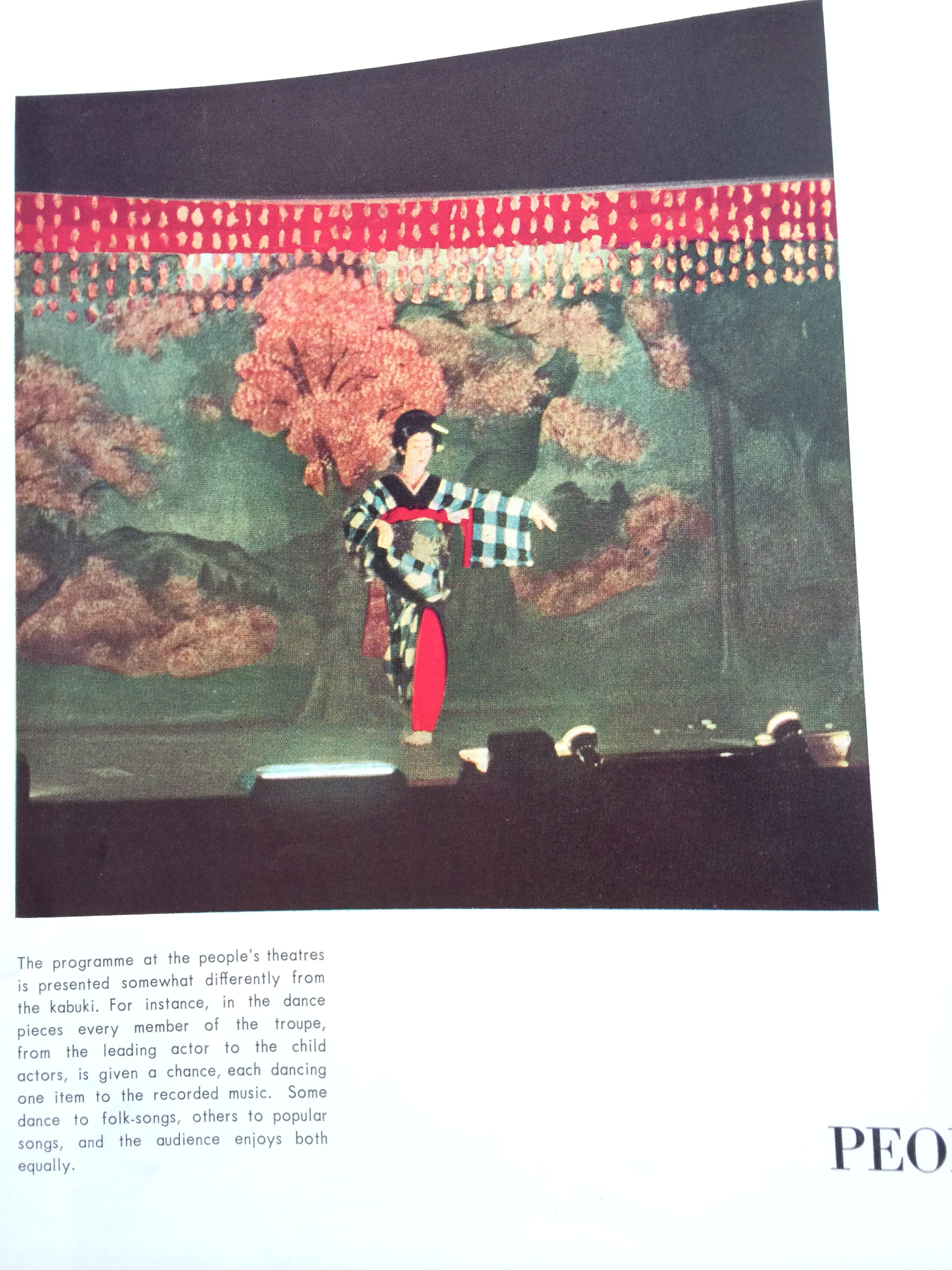 2448x3264 However, it is no match for the success of the Super Sentai Squadron, a fictionalized account of the samurai-rangers and of the Grand Survey that took place in the past few months. Involving Ainu, Russians, Meiji holdouts, bears, wolfmen, and geisha alike, the Super Sentai defeat evil on the frontier six nights a week at your local people’s theater. (++populist fare, ++lowest-common-denominator pablum, ++children’s imaginations) The government of Ezo allocated 5 credits, a rather sizable sum, to the construction of torpedo boats by their French allies, who were more than willing to oblige. The construction of 25 torpedo boats will take some time, however, and the French have promised 15 of the boats by Q2 of 1888, with the final 10 to arrive by Q3. Meiji is expected to act in kind with their German allies. (+Boats! Eventually) The process of modernizing Sado’s gold mine operations has begun in earnest, and some expect that by Quarter 1 of 1888, efforts by foreigners in Ezo to modernize operations and ensure the inhabitants of the island are able to utilize the new technology will yield benefits for the government of Ezo. With time, these benefits will only grow. (+Sado mine effectiveness) With Goryokaku in ruins, some are calling for the construction of a new grand fort, and one that incorporates not just the military aspect of the fort, but also its role as the administrative capital of the Republic. (+Need to rebuild Goryokaku) Map September 1877  1725x2175 JosefStalinator fucked around with this message at Mar 2, 2014 around 01:47 |
| # ? Mar 1, 2014 22:48 |
|
Extras (the real Ezo Republic): 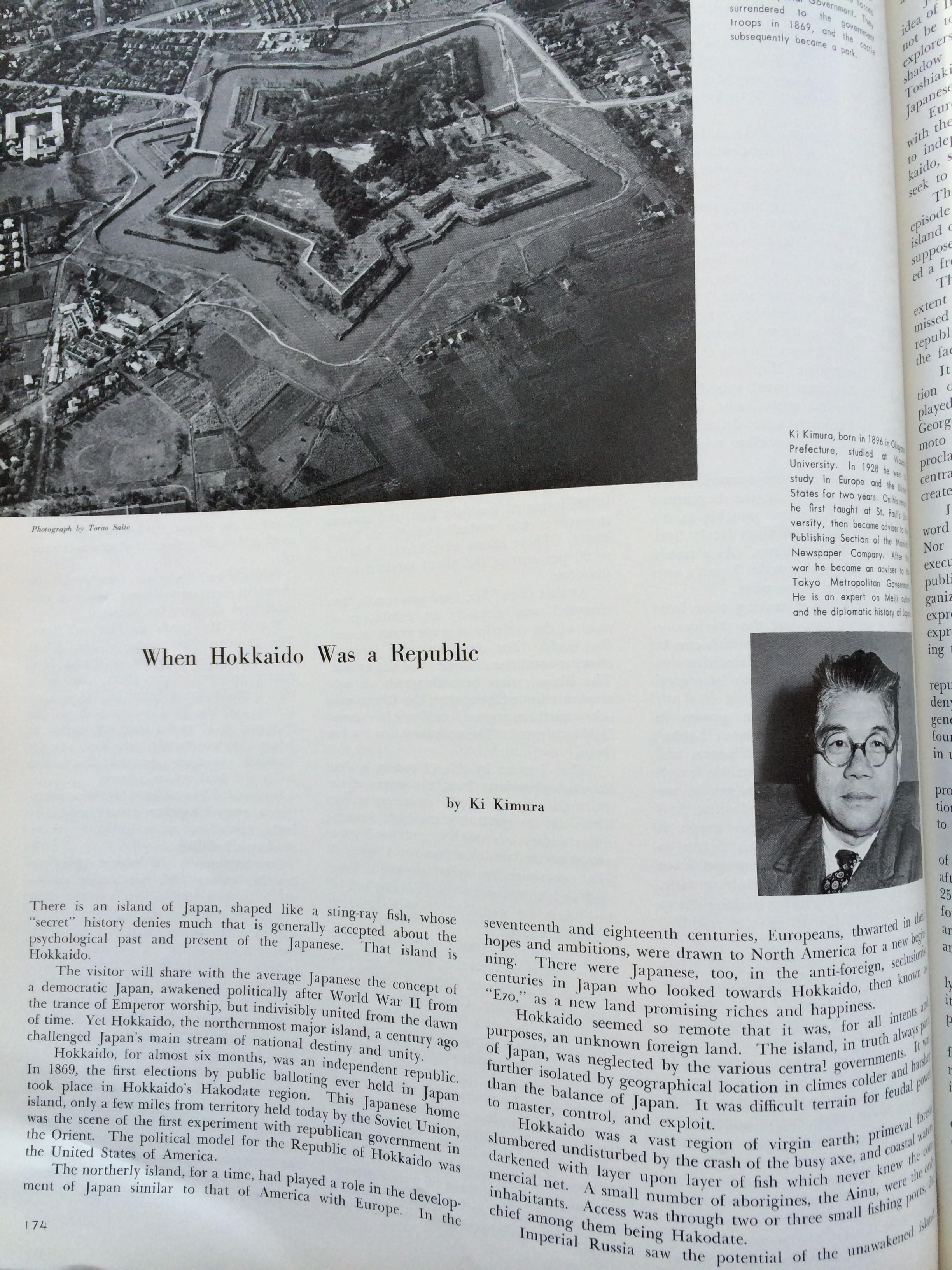  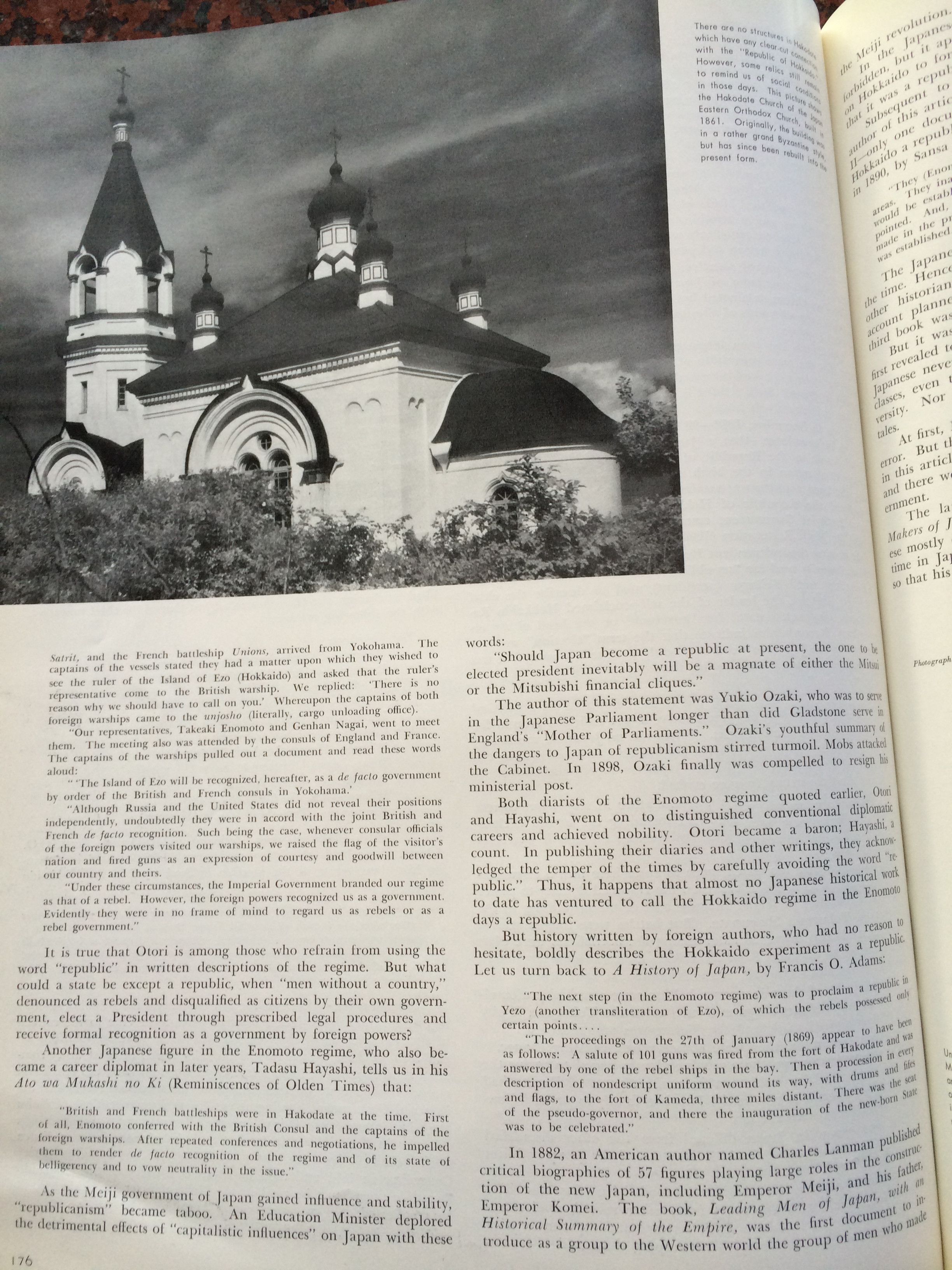  2448x3264 Omake: 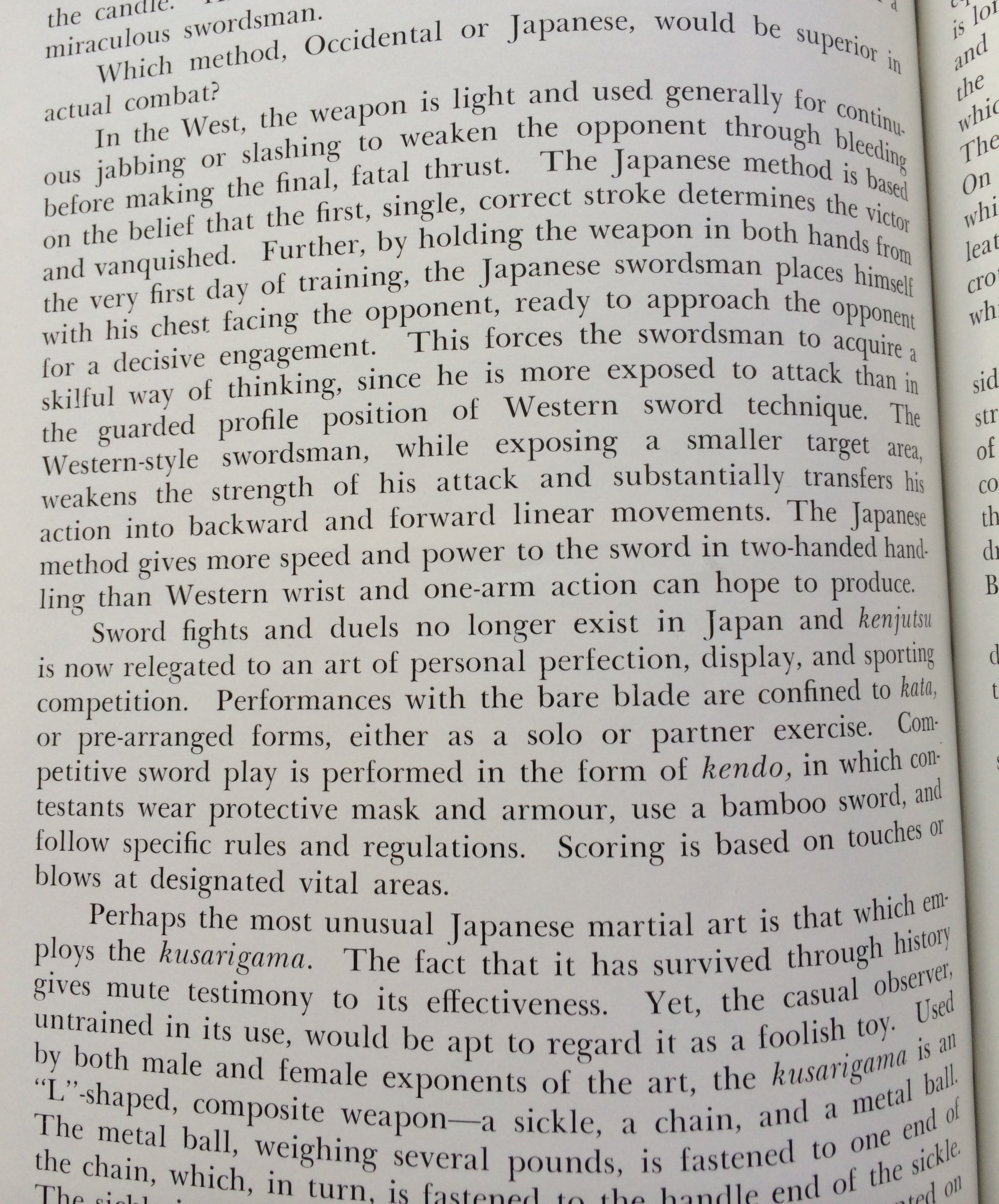 2391x2883
|
| # ? Mar 1, 2014 22:56 |
|
 NEW RULE! NEW RULE!  In order to avoid legislative clutter, every samurai will be able to submit 1 bill per turn, per player. Non-samurai within the cabinet also can propose 1 bill/turn. As for budgets, only the finance minister and president can propose budgets to be voted on. Anyone can make suggestions of course, but they will not be officially submitted. If you don't like a budget, use your legislative clout to stop it (or shut down government).
|
| # ? Mar 1, 2014 23:55 |
|
I'd like to join as Enomoto Michiakira.
|
| # ? Mar 2, 2014 06:45 |
|
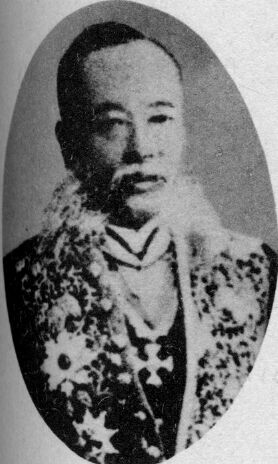 Otori Keisuke, Prisoner Shit! *Seppukus*
|
| # ? Mar 2, 2014 06:52 |
|
Thomas Crusoe, Hairless, On the Lam quote:Towering over them all is Crusoe and he is naked and bowing, huge and pale and hairless, like an enormous infant. He never sleeps, he says. He says he’ll never die. Anonymous letter to Nagai Naoyuki Think not that I am come to send peace on Ezo: I came not to send peace, but a sword. Sincerely Yours, Sic Semper Tyrannis
|
| # ? Mar 2, 2014 10:43 |
|
Matsumae Takahiro Fellow samurai of the Republic, I bring you grave news. The Satsuma rebellion is no more. Saigo Takamori-dono and his soldiers proudly, but inevitably faced their death against merciless Meiji forces. While their leader captured me and, until his very end, didn't permit me to take my sword against Meiji with him, I feel nothing but admiration and respect for him. He was a giant among the man and an example for every samurai in the Republic. What happened, though? Saigo Takamori-dono and his people were great warriors, how could they fall against common rabble, drafted against their will? They were outnumbered, yes. Their weapons, while formidable, certainly had worse reach than muskets and gatlings. But this is not all. They faced the very worst thing that can happen to a samurai - betrayal. I have been sent by the president to support the rebellion with 5,000 of our finest soldiers. Unfortunately, the Army Minister, Otori Keisuke, only let me take a fifth of them. Nevertheless, I sailed, as commanded. Maybe even a 1,000 would have been enough, who knows? Little I knew, however, that someone else was also sent from Ezo. A hired killer were dispatched to cowardly slay Saigo Takamori while he sleeps and implicate the President and me. While the first part of his plan didn't succeed, the second one did. My forces were attacked and disarmed or outright slain. I remained a prisoner of Saigo-dono and nothing I said could convince him I were innocent. It's only the bravery and competence of Shinsengumi that saved me from being slaughtered by victorious Meiji forces. The news about the recent coup were saddening, but not surprising. The traitors' plan succeeded, after all - they gained sufficient pretext to depose the lawfully elected president and impose their dictatorship on people. Only one thing prevented their triumph, however: their own trickery and cowardice. A betrayer cannot make anything permanent or even lasting. Kami find him abhorrent. People's faith in him falters. His own hands become paralyzed by his weakness, unable to skillfully wield a sword. Everyone involved in this travesty should commit seppuku immediately. Their families do not deserve the shame these wretches brought on them. I hope they are not too cowardly to do even that. The rest of us, however, should stay vigilant against the falsehood and corruption in our midst. For that reason, I propose the following act: quote:Strengthen the Republic Bill
|
| # ? Mar 2, 2014 11:43 |
|
Gantolandon posted:e) counterintelligence within their respective forces No offense Matsumae-dono but I doubt NINJA will reveal themselves simply to be tortured and interrogated. Disbanding NINJA and making further unauthorized espionage illegal will probably suffice, if we manage to capture any active members of NINJA we can simply question them at that stage.
|
| # ? Mar 2, 2014 21:45 |
|
Horace Capron Well then, that was all extremely unpleasant, but onward and forward I suppose. Now, the Meiji would be quite foolish if they didn't think to try to capitalize on this. I will do my best to convince my own government and fellow American citizens to intervene on behalf of the Ezo Republic. Of course, understand that if the United States Government would intervene here, they would incur a cost there. If only for lost opportunities from trade with the Meiji. So, if I may be candid, gentlemen. When I try to convince one that the Ezo Republic would be a friend to the United States of America, I'll be asked to clarify how deep such a friendship runs. I can attempt to offer nothing concrete, simply that our continued existance would be worth the costs they would entail, and it might work. But if I would have the liberty to guarantee certain favoured trade arrangements, tax reliefs and other advantages, that would help.
|
| # ? Mar 2, 2014 22:10 |
|
Unknown Stranger I think we should just give up!! I am sure the Meiji will forgive us if we apologize enough.
|
| # ? Mar 3, 2014 06:56 |
|
Hey all, the OP has been updated with some new characters, or details about the backgrounds of currently NPC characters. New players are encouraged to take up some of them (especially for the sparsely-populated factions), or to make up your own. Even more potential characters will be forthcoming! Some of the new characters include: Ogasawara Nagamichi (S) [Homeland faction]- a formerly prominent Tokugawa official, previously ruler of the Karatsu Domain, has much experience dealing with the British Itakura Katsukiyo (Education Magistrate) (S) [Chained Country faction] - in charge of the curricula in the few state-sponsored schools (all for samurai children, mostly funded through wealthy donors), an archconservative minister of propaganda Setsuhaya, son of Tsukinoeaino (Bear Star Clan) [Ainu faction] - rejects his father's conciliatory approach towards the Japanese, still sees them as invaders to be gradually expelled. Saji Kobei [Freedom Party] - agrarian laborer working for the Aizu (Matsudaira clan), agitating against his clan's stranglehold over Ezo affairs and voiceless status of the peasantry. Russian Orthodox convert. Matsumae Nagahiro (S) [Nationalist faction] - a prominent scion of the clan, zealous Shinto-Buddhist and interested in shaping the reformation Matsudaira Naritami, wizened chamberlain of the Tokugawa and the caretaker of the child shogun is still available!!! So is Emperor Enjuu! But as a special character of much power, email the GMs for details if you would like to play as him. Maximo Roboto fucked around with this message at Mar 3, 2014 around 13:22 |
| # ? Mar 3, 2014 12:55 |
Emperor Enjuu With all this chaos it is clear now that my attempt to stay above political matters was an error. It was an error born of trust in my people, trust that they were wise and responsible enough to govern themselves, trust that was ultimately misplaced. But it is not the people's fault - it is mine. If a father says and does nothing while his children mock tradition and create chaos, who is to blame? Only a fool would deride the children for acting as such. Some fathers are too lenient out of cowardice or ignorance, but some are too lenient out of love - as I have been these past few years. I will be holding court the next few months, and encourage those who wish my advice to speak with me.
|
|
| # ? Mar 4, 2014 11:20 |
|
Action Points for Turn 4 1280x395 Best post of turn is awarded to Litos, for all of his many many plans in his attempted coup. Next time have a contingency in case the fella you let go returns with an army. stalin-chan also deserves special recognition for the classic "Blakiston's Loss" - just a friendly reminder that there is always room for Ezo media of any kind, including such photos! Finally, Colonel Wood gets props for winning a duel, even if it did consist of a gunfight against a one-legged man. Duels are always canon!
|
| # ? Mar 5, 2014 00:08 |
|
Am I no longer in the Cabinet? 
|
| # ? Mar 5, 2014 06:31 |
|
It seems to have been deleted by accident, so that will be restored to you. Another matter: communiqués. All players wishing for extra intel on a specific topic or matter is free to email the GMs for such detail, and a response will be sent before the end of a turn. Please mention what specific topic that you would like details on. If a player would like to pen a letter, say to a foreign home government or another similar NPC organization or individual, they may do so as well. Previously, communiqués were given out at random, but now they will either be 1) done so if a player requests it, or 2) granted for special plot reasons. Maximo Roboto fucked around with this message at Mar 5, 2014 around 10:33 |
| # ? Mar 5, 2014 10:30 |
|
Ataman Hijikata Toshizō, The Demon of the Shinsengumi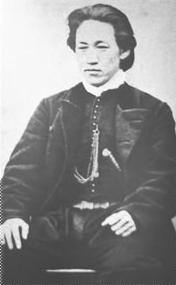 I support Matsumae Takahiro proposal. Naoyuki, the proposal is to give those members in NINJA a chance to reconsider their position and loyalties. If they realize that their true loyalties lie with our republic than some renegade admiral, then it will be fortuitous for them to come in. Just having them all be executed without any sort of olive branch will only hurt us.
|
| # ? Mar 5, 2014 10:53 |
|
Matsumae Takahiro Obviously, interrogation means questioning here. Torturing someone who willingly surrenders himself is a grave offense no man should condone. Obviously it would also mean no one would ever surrender to us. We don't want to kill common mambers of NINJA, who only followed orders of their superiors. The general idea is that most of them surrenders and gets released without consequences. Of course, this would be unthinkable for a samurai, but most members of the NINJA are not warriors and shouldn't be held to that standard. Besides, most of them were convinced they fought for the Republic. What we want is their leadership who isn't likely to surrender.
|
| # ? Mar 5, 2014 15:15 |
|
Maximo Roboto posted:
Oooh, can I volunteer?
|
| # ? Mar 5, 2014 15:35 |
|
Josef bugman posted:Oooh, can I volunteer? You may. Welcome! Come join us on IRC (#bop on synirc) if you want some more information or have any specific questions. A lot of the politicking occurs there too.
|
| # ? Mar 5, 2014 17:20 |
|
JosefStalinator posted:You may. Welcome! Come join us on IRC (#bop on synirc) if you want some more information or have any specific questions. A lot of the politicking occurs there too. Depends on what time, I am on GMT so it's bedtime for me atm. But will try and make it there when I can.
|
| # ? Mar 5, 2014 17:28 |
|
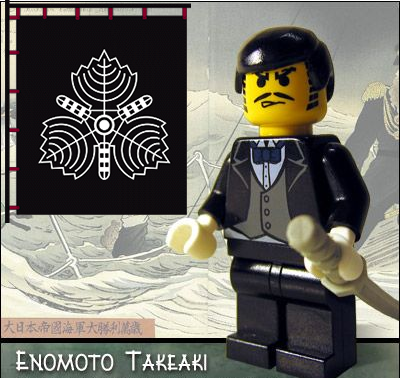 With the Republic having been calmed somewhat after the events of the coup, I am cautiously optimistic about the future. First of all, those officers and legislators who joined in with the coup will be put to trial. According to both the laws of our constitution and those of our ancient traditions, these men are traitors who sought personal gain above the benefit of the nation. However, I will attempt to not prejudice the case, and allow the courts to simply deal with the matter. To fill the vacancies in Congress, we must call a series of special elections, as outlined in the constitution. These elections will take place within 3 months to allow enough time for candidates to file and prepare their campaigns. The military buildup by the Meiji is proceeding apace. For those who believe that Ezo can throw out the foreigners and ignore the outside world, I say to you, we will never be able to rest until the Meiji recognize that Ezo is a separate nation, under treaties of non-aggression recognized by the great powers of the world. With the defection of a large portion of our navy, we're more vulnerable than ever. Something must be done. In accordance with the constitution, I call upon the Army Minister and Navy Minister to present to me within a short time their opinions on the current situation vis-a-vis the Meiji, and their plans to ensure the protection of both Ezo and Sado. We can not let the sacrifice of the past be in vain, Sado island is vital to the future prosperity and independence of Ezo.
|
| # ? Mar 5, 2014 17:40 |
|
Josef bugman posted:Depends on what time, I am on GMT so it's bedtime for me atm. But will try and make it there when I can. No worries. Maxrob and JosefStalinator are the GM's, so just message one of us if we're on.
|
| # ? Mar 5, 2014 18:04 |
|
*** ATTENTION *** Sunday Sunday Sunday, March 9, at 11:59 PM CST (GMT - 6) is the due date for the turn. BE HERE OR BE SQUARE
|
| # ? Mar 8, 2014 01:01 |
|
That is the time its starting not finishing right?
|
| # ? Mar 8, 2014 01:19 |
|
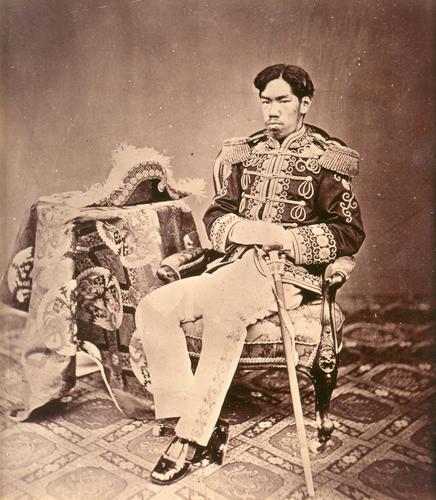 Emperor Meiji Hark, what is out there by my window. Oh, 'tis nary but my hundred-ship strong armada, cannons a-thwart, all prepared to rain fire and death upon the cowardly splittist north. Abandon all hope, ye weak-willed insects. Cannonballs will drop upon Hokkaido like tanuki kintama descending upon you pack of miserable insects. However, some of you will be spared. All foreigners may leave if they swear to no longer stand in the way of the righteous destiny of the Yamato race. The Ainu aboriginals may live in peace if they take spear and stone against the false emperor and the samurai heretics. Whichever man brings the head of the so-called shogun will receive the highest reward that we can bestow to an island of traitors. Amnesty will be given to those considered criminals by the traitors, and honors to those who actively work against said traitors. Traitors against traitors will be given the highest honor possible. This is the decree of the gods.
|
| # ? Mar 8, 2014 02:04 |
|
Josef bugman posted:That is the time its starting not finishing right? This is the time by which you must email your orders for the turn to ezorepublic.gm@gmail.com. Also, I'll be on IRC for a bit if you have any questions.
|
| # ? Mar 8, 2014 02:31 |
|
Tsukinoaeino We would like trade restrictions lifted on the Ainu and other concessions. Otherwise it will be very difficult to convince my people that the unfulfilled promises of Ezo are any more believable than the hollow promises of the Meiji.
|
| # ? Mar 8, 2014 03:23 |
|
Maximo Roboto posted:
*Distant echo in the wilderness* Hell yea! yea... yea... yea.. ye
|
| # ? Mar 8, 2014 04:39 |
|
Matsudaira Sadaaki 松平 定敬 (S) Army Minister I have compiled a report on the state of the land forces of the Ezo Republic. Please forgive me relative tardiness, personal affairs have kept me busy. Our current records report our current armed forces as such: 800 Elite Samurai 8,100 Samurai Infantry 3 armstrong guns 5,300 peasant conscripts Meanwhile, we can estimate the Meiji response to be at least 60,000 troops, the number that were sent (before reinforcements) to defeat the Satsuma Uprising. Considering the situation, however, I would not be surprised if they sent much more than that. I would not be surprised if they sent 80,000, or even 100,000 filthy peasant conscripts to try and stop us. But whether or not they send the minimum expected, the maximum, or even more, I should note that our army is similar in size and composition to the Great Saigo's. His forces, lead by great samurai much like our own, numbered 15,000, and could not do a thing against the endless tide of Meiji peasants. It should be noted that other armed forces exist in Ezo, such as Brunet's mercenary group, and whatever it is the Ainu have. However they are not a part of the regular army, I disregarding them for the sake of this present report. The fact is, tragically, that we are likely to be quite drastically outnumbered should the Meiji make a full military landing on Ezo. It would be anywhere from 4-to-1 to 6-to-1 or worse. While our native terrain and defensive military infrastructure will give us an advantage, I must note that if we were to face those kinds of odds our chances of victory would be slim at best. But this is not to say that there is no hope! It is not the place of a General to whine and cry about how a battle cannot be won! I know, personally, that I can kill at least six of those Meiji dogs. I could even kill ten! Compared to our elite troops, the Meiji forces are nothing but untrained peasant trash! Our agile and skilled troops are capable of battlefield maneuvers that those dogs couldn't even dream of! If we are to fight with those odds, we will do it, and we will put fear into the hearts of the Meiji! We should note, however, that we may not even fight against those kinds of numbers. Everything I wrote above ignores the factor that our superior naval forces may have upon the war, and assumes that they do absolutely nothing to protect our shores. This is not going to be the case, but I am not going to plan a war strategy that relies on others to do my job. So, in short: -Should the Meiji land all, or the majority of their forces, we will be outnumbered quite badly. -We hold a major advantage in troop quality -Barbarian (Gaijin, Ainu) mercenaries/militias may play a factor in the battle
|
| # ? Mar 8, 2014 07:10 |
|
Unknown Stranger Against such a huge army, I question if we even stand a chance! Mightn't we just surrender, and beg forgiveness? It would be much less harsh and more honorable than dying senselessly!
|
| # ? Mar 8, 2014 07:13 |
|
Katsu Kaishū (勝 海舟)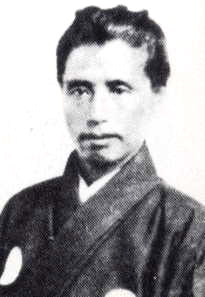 quote:My president, having reviewed the state of our naval defenses, I must impress upon you my sincere belief that we cannot afford to hold two islands. After Ikunosuke's betrayal, we are left more vulnerable than ever, with only three ships of note in our defense. Splitting this force would be, at best, unwise, and at worst, the end of our fair republic. As the honorable Army Minister has pointed out, this is a fight we cannot win on the ground, and while I will do my utmost to defend the Shogun and the Republic from the seas, there are limits to my abilities. I am afraid, my president, that we must make a choice... quote:Bill 4-1 - Wartime Contributions Act, Pt II
|
| # ? Mar 8, 2014 10:10 |
|
 I refuse to believe that it is impossible to adequately defend the Republic from the Meiji. We would never have been able to defend ourselves against the Meiji using conventional tactics. I have already spoken to the Minister of the Army. Minister of the Navy Katsu Kaishu, your statement is simply unacceptable. Though it is difficult, I call upon you to formulate a plan that lies outside the bounds of Meiji thinking. If we can not defend both Sado and Ezo from the Meiji, the solution is not to give up one or the other. The solution is to change the state of the game such that the Meiji can not attack both Sado and Ezo.
|
| # ? Mar 8, 2014 19:02 |
|
Erwin Balz Friends, Ezoians, fellow human beings! Why must you send your sons off to war? Full of pride and honor, only to have them slaughter and be slaughtered by the forces of your foe? There will be no honor in this war, it will be senseless killing and bloodshed, the fields of Ezo will be strewn with the slain from both sides. Spare your mothers, your wives and your sisters the toil and anguish at getting a notice saying that their son, husband or brother has died. Spare your country the fires of war, the great fires that can never be quenched. Instead of this bloody conflict I propose an alternate solution, send your leaders to meet with those of the enemy in the grand city of Berlin, capital of the German Empire. Let us discuss and settle this like men. Not like wild animals, raping and killing those who disagree with us. If the president goes then Meiji will have to go, lest they be thought of as uncivilized and barbaric. Come now great senators of Ezo, let us stop the bloodshed before it starts. mcclay fucked around with this message at Mar 9, 2014 around 00:04 |
| # ? Mar 8, 2014 23:56 |
|
  The Announcement of the Formation of the Nationalist Party Since the foundation of the Republic of Ezo, the Republican Party has attempted to balance the needs of the nation with the strictures of our tradition. We did not move here to end the domination of the samurai, nor to see the samurai slip into the past as some relic of the past. The samurai are necessary to the nation of Ezo, and their place within the state will remain a unique one. With the attempted coup against the government, it has become clear that the Republican Party is currently without purpose beyond supporting a status quo that no longer serves the nation well. We have attempted to maintain our independence with an armed fleet, yet the constant increases in Meiji naval strength and the defection of the Christian-infiltrated naval forces have left us in a dire situation. We need a new, strong, unified government able to pass the laws necessary to maintain the Republic of Ezo! The Nationalist Party maintains a number of core tenets which all members of the party are required to swear an oath to before they can join. In the manner of the American parties functioning in that other Republic, we have produced a Party Platform to allow voters to see how the Nationalist Party is different from other parties. 1. Ezo is a Constitutional Republic based upon the law. All members of the Nationalist Party will swear to uphold the constitution of the Republic of Ezo above and beyond all other traditional obligations. 2. It is necessary for Ezo to maintain a naval force superior to that of the Meiji. Without a superior naval force, we are unable to maintain our independence. The Meiji are an existential threat to the Republic of Ezo. 3. It is absolutely necessary that Ezo maintain the friendship and support of advanced European nations, while at the same time ensuring that they respect our independence, culture, religion and traditions. We can not eject foreigners from Ezo, we can not close off the nation from foreign influence. 4. The traditions we carried with us from Japan are not to be reformed. Non-samurai do not have the political knowledge, education or responsibility to be trusted with the vote. 5. A member of the Nationalist Party will support whichever policies can best strengthen the nation, militarily, economically and culturally. As leader of the Republican Party, I hereby disband the Republican Party wholesale, and proclaim myself the first member of the Nationalist Party. I invite all other legislators who are willing to accept the platform of the Nationalist Party to proclaim their membership.
|
| # ? Mar 9, 2014 00:08 |
|
 Enomoto pulls Otori Keisuke onto a stage. He is bound and gagged. His arms and legs are tied tightly where they meet his torso, his limbs purple and swollen. He begins to read from a paper... "And the LORD God said unto the serpent, Because thou hast done this, thou art cursed above all cattle, and above every beast of the field; upon thy belly shalt thou go, and dust shalt thou eat all the days of thy life." Enomoto looks around the assembled crowd "Those legislators who followed Otori into dishonor have one chance to change their fate. Swear their fealty to the Constitution, THAT is your new Shogun, THAT is your new Emperor. Otherwise, you shall experience the wrath of the Christian God some of you profess to believe in, you shall share the fate of Otori." Enomoto nods to two men who pull down the gag from Otori's mouth. They force open his mouth, his tongue having been cut into a fork, still bloody. They hold him down and Enomoto draws his katana with a heavy sigh. Dust shalt thou eat all the days of thy life. Perhaps Christianity does have much to teach us... I shall have to study this book further. A grim chuckle, then Enomoto raises his katana and begins to hack off Otori's arms and legs...
|
| # ? Mar 9, 2014 01:48 |
|
 Since our finance minister is obviously super busy doing something else... Budget posted:Bakuhan Taisei tax structure: Apart from increasing the budget of the Internal Security agency, since no proposals have been placed, and the French claim to have no further ability to sell us ships, the finances have been put towards servicing our debt. I also introduce the following bill Bill 4-2, Ainu Normalization Act posted:The Ainu will henceforth be considered full citizens of the Republic of Ezo, and be granted the status of 'ko' for taxation purposes. No limitations or advantages will be applied to them that would not be applied to any other citizen. I also nominate Matsumae Takahiro to the position of Education Magistrate. It will be his job to replace Itakura Katsukiyo (NPC), who was involved in the coup attempt last year. He will be investigated fully, and if the Sakoku faction is found to have had a hand in that, it will bode ill for them.
|
| # ? Mar 9, 2014 04:59 |
















